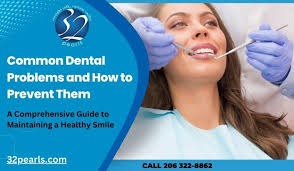Introduction
Dental health plays a crucial role in our overall well-being, yet many of us tend to overlook it until we experience discomfort. From cavities to gum disease, there are several common dental problems that can affect our oral health. Luckily, with proper care and attention, most of these issues can be prevented. Let’s dive into the most common dental problems and discuss ways to keep your smile healthy and bright.
Tooth Decay (Cavities)
Tooth decay, commonly known as cavities, is one of the most prevalent dental problems affecting people of all ages. It occurs when the enamel (the hard outer surface of your tooth) is damaged by acids produced by bacteria in the mouth. To get more info, Click Here.
What Causes Tooth Decay?
Tooth decay is primarily caused by the build-up of plaque, a sticky film of bacteria that forms on the teeth. When you consume sugary or starchy foods, the bacteria in plaque produce acids that attack your enamel, leading to cavities over time.
Symptoms of Cavities
Common symptoms of cavities include toothache, sensitivity to hot or cold, visible holes or pits in your teeth, and pain when biting down.
Prevention Tips for Tooth Decay
Preventing tooth decay starts with good oral hygiene habits:
- Brush your teeth at least twice a day with fluoride toothpaste.
- Floss daily to remove plaque from between your teeth.
- Use fluoride treatments or mouth rinses to strengthen your enamel.
- Reduce sugary snacks and drinks, as these fuel the bacteria that cause decay.
Gum Disease (Gingivitis and Periodontitis)
Gum disease, or periodontal disease, is a common but preventable condition that affects the gums and bones that support the teeth.
What is Gum Disease?
Gum disease starts with gingivitis, an inflammation of the gums caused by plaque build-up. If left untreated, gingivitis can progress to periodontitis, a more serious condition that can lead to tooth loss.
Symptoms of Gum Disease
Early symptoms of gum disease include red, swollen, or bleeding gums. As the condition worsens, you may experience bad breath, receding gums, and loose teeth.
Preventing Gum Disease
To prevent gum disease:
- Brush and floss daily to remove plaque.
- Visit your dentist regularly for cleanings and checkups.
- Quit smoking, as it increases the risk of gum disease.
- Use antibacterial mouthwash to reduce bacteria in the mouth.
Bad Breath (Halitosis)
Bad breath, also known as halitosis, can be embarrassing and socially isolating, but it’s often preventable.
Common Causes of Bad Breath
Bad breath can result from poor oral hygiene, certain foods (like garlic and onions), dry mouth, or medical conditions like sinus infections or diabetes.
Preventing Bad Breath
To keep your breath fresh:
- Brush your teeth and tongue regularly.
- Stay hydrated, as dry mouth can contribute to bad breath.
- Avoid tobacco and strong-smelling foods.
- Chew sugar-free gum to stimulate saliva production.
Tooth Sensitivity
Tooth sensitivity can cause sharp pain when your teeth are exposed to hot, cold, sweet, or acidic foods and drinks.
What is Tooth Sensitivity?
Tooth sensitivity occurs when the dentin (the layer beneath the enamel) becomes exposed, usually due to enamel erosion or receding gums.
Causes of Tooth Sensitivity
Common causes include:
- Brushing too hard or using a hard-bristled toothbrush.
- Gum disease leading to gum recession.
- Regular consumption of acidic foods and drinks.
Prevention and Management of Tooth Sensitivity
- Use a soft-bristled toothbrush and brush gently.
- Switch to toothpaste designed for sensitive teeth.
- Limit your intake of acidic foods and drinks.
Tooth Erosion
Tooth erosion occurs when acids wear away the enamel, leading to sensitivity and discoloration.
What Causes Tooth Erosion?
Frequent consumption of acidic foods and beverages, like soda or citrus fruits, as well as acid reflux (GERD), can contribute to tooth erosion.
How to Prevent Tooth Erosion
- Rinse your mouth with water after consuming acidic foods or drinks.
- Wait at least 30 minutes before brushing your teeth after eating acidic foods to avoid further enamel damage.
- Reduce your intake of highly acidic beverages.
Cracked or Chipped Teeth
Cracked or chipped teeth can happen for various reasons, from biting hard foods to suffering an accident.
Common Causes of Cracked Teeth
You can crack or chip a tooth by chewing hard foods like ice or candy, experiencing a fall or blow to the face, or grinding your teeth at night.
How to Prevent Cracked or Chipped Teeth
- Avoid biting down on hard objects.
- Wear a mouthguard if you grind your teeth or play contact sports.
- Visit your dentist regularly to catch any minor issues before they become serious.
Tooth Discoloration
Discoloration can make your teeth appear yellow or stained, affecting the brightness of your smile.
Why Does Tooth Discoloration Occur?
Tooth discoloration is often caused by drinking coffee, tea, red wine, or smoking tobacco. Natural aging can also contribute as the enamel wears away.
How to Prevent Tooth Discoloration
- Brush your teeth immediately after consuming staining foods or drinks.
- Consider professional whitening treatments for a brighter smile.
- Avoid tobacco products.
Impacted Wisdom Teeth
Impacted wisdom teeth are third molars that do not have enough space to fully emerge from the gums, which can cause pain and other dental issues.
What Are Impacted Wisdom Teeth?
When wisdom teeth don’t have room to grow properly, they can become trapped under the gum or grow at an angle, leading to discomfort and infection.
Preventing Issues with Wisdom Teeth
Regular dental checkups will help monitor the position of your wisdom teeth. If they’re causing problems, your dentist may recommend extraction.
Dental Abscess
A dental abscess is a pus-filled infection that forms in the gums or tooth root, often due to untreated cavities or gum disease.
Symptoms of a Dental Abscess
You may experience severe pain, swelling, fever, and a bad taste in your mouth if you have an abscess.
Preventing Dental Abscess
- Address cavities and gum infections promptly.
- Maintain proper oral hygiene.
- Don’t ignore persistent tooth pain.
Tooth Grinding (Bruxism)
Tooth grinding, or bruxism, typically occurs during sleep and can lead to tooth damage, jaw pain, and headaches.
Causes and Symptoms of Tooth Grinding
Stress and anxiety are common causes of bruxism, which can wear down your teeth over time.
Preventing Bruxism
- Manage stress through relaxation techniques.
- Wear a nightguard to protect your teeth while you sleep.
Dry Mouth (Xerostomia)
Dry mouth, or xerostomia, occurs when your salivary glands don’t produce enough saliva, leading to discomfort and increased risk of cavities.
Managing and Preventing Dry Mouth
- Stay hydrated by drinking plenty of water.
- Chew sugar-free gum or suck on sugar-free candies to stimulate saliva flow.
- Avoid caffeine and alcohol, as they can dry out your mouth.
Oral Cancer
Oral cancer can develop in the mouth or throat and is often linked to tobacco and alcohol use.
Risk Factors for Oral Cancer
In addition to tobacco and alcohol, the human papillomavirus (HPV) is a significant risk factor.
Preventing Oral Cancer
- Avoid tobacco and limit alcohol consumption.
- Get regular screenings from your dentist.
- Practice safe sex to reduce the risk of HPV-related oral cancer.
Conclusion
Maintaining good dental hygiene and addressing problems early is the key to avoiding most common dental issues. By adopting a proactive approach to your oral health—brushing, flossing, regular dental checkups—you can keep your smile healthy for years to come.
FAQs
What are the signs of gum disease?
Common signs include swollen, red, or bleeding gums, persistent bad breath, and receding gums.
How can I prevent bad breath naturally?
Brushing your tongue, drinking water, and chewing sugar-free gum can help keep bad breath at bay.
How often should I visit the dentist?
It’s recommended to visit the dentist every six months for cleanings and checkups.
What foods should I avoid for better dental health?
Limit sugary and acidic foods like candy, soda, and citrus fruits to protect your teeth.
Can tooth decay be reversed?
Early tooth decay can sometimes be reversed with fluoride treatments, but cavities that have already formed need to be treated by a dentist.





